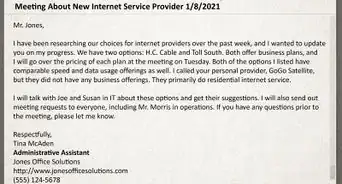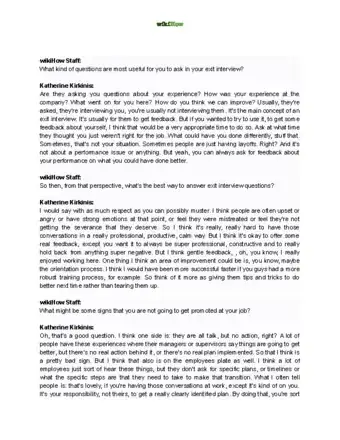This article was co-authored by Katherine Kirkinis, Ed.M., MA and by wikiHow staff writer, Hannah Madden. Katherine Kirkinis is a Career Coach and Psychotherapist who has served as a career expert for Forbes, Medium, Best Life, and Working Mother Magazine, and as a diversity and inclusion expert for ATTN and Quartz. She specializes in working with issues of career, identity, and indecision. She has doctoral-level training in career counseling and career assessment and has worked with hundreds of clients to make career decisions through career assessments. She is pursuing a doctoral degree at The University of Albany, SUNY where her work focuses on diversity and inclusion, racism in the workplace, and racial identity. She is a published author and has been featured in academic journals as well as popular media outlets. Her research has been presented at 10+ national APA conferences since 2013.
There are 7 references cited in this article, which can be found at the bottom of the page.
This article has been viewed 1,929 times.
When your boss gives you a new task or a tough project, it can feel like a hidden message: are they questioning your abilities? Or are they trying to see if you’re a good leader? Higher-ups will occasionally “test” their employees to see if they’re the right fit for a new position or if their skills are up to snuff. Fortunately, after reading this article, you won’t have to wonder if your boss is testing you anymore. We’ll give you a list of 14 things your boss might be doing as a subtle way to test you in the workplace.
Things You Should Know
- Your boss may be prepping you for a promotion if you’re getting assigned more work.
- Your supervisor may also be thinking about promoting you if you’re getting less feedback or if they start ignoring your messages.
- Unfortunately, if you’re getting assigned easier tasks than usual or being left out of meetings, it could mean that your boss is considering letting you go.
Steps
You’re being assigned more work.
-
A heavier workload could mean your boss wants to see how you handle it. If you find yourself working longer hours or taking on more responsibilities, it’s a good sign! Your boss may be testing the waters to see if you falter under the pressure or if you rise to meet your potential.[1] X Research source
- While working more often could mean that your boss is planning to give you a promotion, be sure to maintain a work-life balance. Otherwise, you could suffer from burnout.
You’re taking on more challenging work.
-
Harder projects typically mean your boss trusts you more. Maybe you’re working on tasks that no one else is, or you’re slogging through tough problems that only senior-level employees do. When your tasks get harder, it usually means that your boss is trusting you with more responsibility. Show that you can handle it by putting your full effort into your tasks.[2] X Research source
- On the flip side, if you’re being assigned easier work than you’ve done in the past, it could be because you’ve let your work ethic slip a bit. Do your best and work hard to complete these tasks to show your boss you can do your job well.
Other employees come to you for advice.
-
Your boss may be sending others to you because they trust you. If you find that your co-workers are asking you for help with projects or advice on their workload, that’s a really good sign. It means that not only do your employees respect you, but your boss does, too.[3] X Research source
- Try to help your co-workers to the best of your ability, giving constructive advice whenever you can. This will help prove your leadership skills to your boss.
You’re getting less feedback than you used to.
-
Less feedback often means that your boss trusts you more. While getting less feedback can feel a little strange at first, take it as a good sign—usually, this means that your boss knows you don’t need a ton of encouragement and hand-holding to do your best work. Keep proving your boss right by completing projects to the best of your ability.[4] X Research source
- On the flip side, some bosses will actually start giving you much more feedback if they’re prepping you for a promotion or a raise. In that case, take all their feedback to heart, and try to implement it in your daily workload as often as possible.
You’re invited to participate in new meetings.
-
Your boss may be trying to see if you fit in with other higher-ups. When you’re asked to participate in meetings you were previously excluded from, that’s a great sign. Your boss is likely looking to see how you participate and how well you interact with others, so bring your A-game and do your best to shine in these meetings.[5] X Research source
- If the company higher-ups ask you for advice, that’s an even better sign. It means they trust your abilities and they value your judgment.
Your boss asks you about your career goals.
-
Your boss might ask about your goals so they can help you meet them. When you have a one-on-one chat with your boss, are they all of the sudden very interested in where you see yourself working long-term? They may be trying to assess your longevity at the company. Try to answer in a way that makes it clear you’re open to new opportunities at your workplace.[6] X Research source
- For instance, you might say something like, “I’ve always seen myself in a managerial role, and I really like this company. Ideally, I’d like to stay here long-term and work my way into a leadership position.”
You’re working on shorter deadlines.
-
Tighter deadlines typically mean your boss thinks you can handle them. Does your boss task you with projects that need to be done by the end of the day, or by next week? If so, you might be becoming their “go-to” person, or someone to be counted on. This is a very good sign, because it means your boss trusts you with important tasks.[7] X Research source
- Continue completing these projects to the best of your abilities, and try to stick to the deadlines in place (as long as they’re actually do-able). This will show your boss that they can keep counting on you in the future.
Other managers are paying more attention to you.
-
Higher-ups may be hearing your name when it comes to promotions. If your other managers (and not just your direct boss) are all of the sudden interested in chatting or just saying hi, you might just be on their radar. Make a good impression with them by being friendly and cordial in case they’re keeping you in mind for other opportunities down the line.[8] X Research source
- If you’re ever in meetings with other higher-ups, do your best to give thoughtful advice and participate as much as you can. This will keep you on their radar.
Your boss asks you to lead a team.
-
When your boss gives you a leadership role, it means they trust you. Even if you aren’t being formally promoted just yet, when you lead a team or a project, you’re showing your boss how you can thrive when you’re in charge. Lead your team effectively by delegating tasks and sticking to deadlines to show your boss that you can be trusted in the future.[9] X Research source
- The same thing goes if you’re assigned to a team without a formal leader in charge. Your boss may be subtly hinting that you should step up and take over.
Your boss ignores your messages.
-
Ignoring your questions might be your boss telling you to figure it out. Do you find that your emails and messages go unanswered for hours, or even days? If so, your boss might not be ignoring you out of spite—instead, this could be a hint to follow your own judgment and not rely on your boss for direction.[10] X Trustworthy Source Harvard Business Review Online and print journal covering topics related to business management practices Go to source
- If your boss is hard to get ahold of, try to work through problems on your own before bringing them to your higher-ups. If you do need to ask for advice, come up with a potential solution for your boss to approve before reaching out.
Your boss sends you to conferences.
-
Additional training means your boss is investing in your future. Not every employee gets chosen to do additional training or go to conferences. If you get to, take it as a compliment—it means your boss sees you as a long-term employee who can take on additional work in the future.[11] X Research source
- If you do get training opportunities, do your best to implement your new training into your work. That way, your boss can tell that they’re a good investment.
You’re being assigned less work.
-
Fewer projects could mean that you’re on your way out. If you often find yourself with little to no work to do, your boss may be pulling your projects for a reason. A lighter workload could mean that your manager is seeing how the team functions without you if or when you’re let go.[12] X Research source
- If you’re worried about your job, talk to your boss and ask for more work. Show them that you can handle the tasks they give you in a timely manner to prove that you’re right for the job.
You’re left out of important meetings.
-
Being shunned by higher-ups could mean your job is ending. If you’re normally invited into a meeting or sent a memo but “someone forgot,” you might be getting left out of the loop intentionally. Sometimes, but not always, this means that your job is on the line.[13] X Research source
- Do your best to insert yourself into the same meetings that you’ve always gone to. The more you do your routine like normal, the harder it will be to let you go.
You get blown off when asking for feedback.
-
A lack of feedback could indicate a lack of a future for your job. Maybe you decide to be proactive and approach your manager for constructive feedback—that’s great! But if your boss won’t give you anything, even when asked, it might be a sign that they don’t see keeping you around long-term.[14] X Research source
- Follow up with your boss and keep asking for feedback. Even if your time at your current job is ending, constructive criticism can help you in future positions.
You Might Also Like
 How to Write an Email or Letter to Your Boss
How to Write an Email or Letter to Your Boss






 14 Signs That Your Boss Is Sidelining You at Work (And What to Do about It)
14 Signs That Your Boss Is Sidelining You at Work (And What to Do about It)


 11 Signs Your Boss Doesn’t Like You & How to Win Them Over
11 Signs Your Boss Doesn’t Like You & How to Win Them Over



Expert Interview

Thanks for reading our article! If you'd like to learn more about dealing with your boss, check out our in-depth interview with Katherine Kirkinis, Ed.M., MA.
References
- ↑ https://www.businessinsider.com/signs-youre-about-to-be-promoted-at-work-2016-3
- ↑ https://www.businessinsider.com/signs-youre-about-to-be-promoted-at-work-2016-3
- ↑ https://www.businessinsider.com/signs-your-boss-thinks-you-are-awesome-2016-7
- ↑ https://www.businessinsider.com/signs-youre-about-to-be-promoted-at-work-2016-3
- ↑ https://www.businesspundit.com/14-signs-that-a-promotion-is-in-your-near-future-03-2016/
- ↑ https://www.businessinsider.com/signs-youre-about-to-be-promoted-at-work-2016-3
- ↑ https://www.businessinsider.com/signs-your-boss-thinks-you-are-awesome-2016-7
- ↑ https://www.businesspundit.com/14-signs-that-a-promotion-is-in-your-near-future-03-2016/
- ↑ https://www.businessinsider.com/signs-your-boss-thinks-you-are-awesome-2016-7
- ↑ https://hbr.org/2021/05/what-to-do-when-your-boss-is-ignoring-you
- ↑ https://www.businessinsider.com/signs-youre-about-to-be-promoted-at-work-2016-3
- ↑ https://www.businessinsider.com/more-signs-you-are-about-to-be-fired-2016-8#fewer-projects-are-coming-your-way-9
- ↑ https://www.forbes.com/sites/investopedia/2011/01/07/8-signs-youre-about-to-get-fired/?sh=360f802a1b2c
- ↑ https://www.businessinsider.com/more-signs-you-are-about-to-be-fired-2016-8#you-ask-for-feedback-and-get-blown-off-20
About This Article



























































